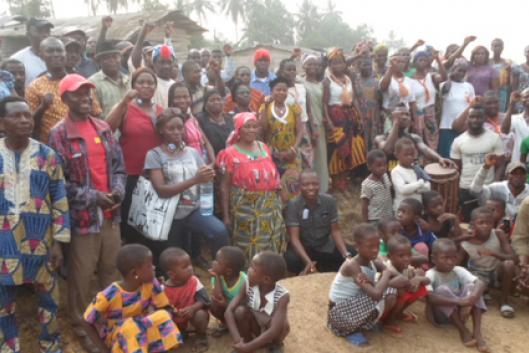We are 40 participants who have united in Mundemba, Cameroon, for an international workshop on the tactics and strategies of oil palm companies, from 28 to 31 January 2016. We have gathered to share our experiences from Cameroon, West and Central Africa, Asia and South America, and to understand the realities of the local communities in Ndian Division, Southwest Region of Cameroon.
We share the concerns of local communities regarding the growing interest in community land for corporate oil palm plantations. The experiences shared during the workshop by the different participants—who came from several countries affected by oil palm plantations and from the home countries of companies involved in this expansion—attest to the dangers communities are facing. In Indonesia, communities have had millions of hectares of land fraudulently taken and destroyed by oil palm companies, and many of these companies are now grabbing lands for plantations in Africa. In many African countries, we see companies systematically failing to keep promises they have made to communities whose lands they have taken through corruption, bribery, lies, intimidation and other devious tactics.
From our field visits to Ndian Town, Fabe, Meangwe II and Ikondo-Kondo resettlement, we witnessed and heard about the tactics and strategies used by oil palm companies. The devastating impacts that plantations have had in other countries are more or less reflected in this part of Cameroon. We witnessed how companies in the area have failed to respect court rulings in favour of the communities or to abide by laws pertaining to the protection of the environment and the acquisition of lands. We are deeply troubled by the intimidation and criminalisation of community leaders and organisers opposed to projects, including the local organiser of this workshop, the Mundemba-based organisation SEFE. We have seen how companies are not providing the basic services and support they promised to communities, such as scholarships, employment, community farms, bridges and roads, royalties, housing, health care, water or utilities. And we have also seen how companies have used divide and conquer tactics to try to break the unity of communities. The companies are not bringing development, but are merely generating poverty, food insecurity, social conflict and environmental destruction.
We are moved by the peaceful efforts of communities and those working with them to protect and maintain control over the traditional use of their lands, which they have looked after for generations. Despite the challenges and difficulties faced by the communities in this area, we appreciate their efforts to defend their interests and we acknowledge their courage. We are inspired by the successes some of these communities have had in preventing companies from taking land in their areas.
Lastly, the participants gathered in Mundemba from various parts of the world for this workshop would like to thank the local government authorities for having made this event possible by guaranteeing the security of all the participants. And we commit to providing all possible support and solidarity to the communities of Ndian Division in their struggle to defend their lands in a peaceful and non-violent way.
Signed in Mundemba, 31 January 2016
Signatories from Cameroon
Struggle to Economise Future Environment (SEFE), Cameroon
Centre pour l'Environnement et le Développement (CED), Cameroon
Réseau des acteurs du Développement Durable (RADD), Cameroon
SYNAPARCAM, Cameroon
Jeunes Volontaires pour l'Environnement Cameroun (JVE-Cameroun)
Réseau de Lutte contre la Faim (RELUFA), Cameroon
Environmental Investigation Agency (EIA), Cameroon
Green Development Advocates, Cameroon
Nature Cameroon
FUFEDA-Edea, Cameroon
Africa Movement Force For Freedom, Cameroon
Korup Rainforest Conservation Society, Cameroon
Environmental Resources Management and Social Issue Center, Cameroon
Chief WANGOE Philp, Fabe village, Cameroon
Chief Moto Divine, Ndiba village, Cameroon
Chiel Mbote Patrick Eleli, Menagwe II village, Cameroon
Chief Okanda Alex, Esoki village, Cameroon
Chief Orume S. Orume, Mosongiseli village, Cameroon
Chief Akama Orume, Idibayanga village, Cameroon
Mosembe Cornelius, Sikam village, Cameroon
Salvadoe Tambe, Ebanga village, Cameroon
Cooperative Agropastorale Filles et Femmes, Libamba, Cameroon
Colette Um, Cameroon
Lotsmart Fonjong, Buéa University, Cameroon
Bila Ellem, Bweme village, Cameroon
Ebokely Martin Esono, Dikome Balue village, Cameroon
Momene Wilson, Esoki village, Cameroon
Violet Fokum, IDRC-Buéa University, Cameroon
Njuma Leslie, Ndian Town village, Cameroon
John Arreymbor, Divisional Delegate of Environment, Cameroon
Efokoa Charles, Buéa, Cameroon
Oku Nelvis, Ikoti village, Cameroon
Okpo wa Namolongo, Lipenja II village, Cameroon
Gregory Orume, Mosongiseli village, Cameroon
NGOE Gabriel Iselle, Fabe village, Cameroon
Prince Akama, Ndian Town village, Cameroon
Cameroon Ekale Cecilia, Ndian Town village, Cameroon
Epamba Verine, Meangwe II village, Cameroon
Njuma Larry, Mundemba, Cameroon
International signatories
Association pour le Développement Durable et la Protection de l’Environnement en Guinée (ADAPE), Guinea
ATTAC-Gabon, Gabon
Brainforest, Gabon
Bread for All, Switzerland
Community Forest Watch Network, Nigeria
Environmental Rights Action (ERA), Nigeria
Forum pour la gouvernance et les droits de l'Homme (FGDH), Congo-Brazzaville
GRAIN
Observatoire congolais des droits de l'Homme (OCDH), Congo-Brazzaville
Réseau d'information et d'appui aux ONG nationales (RIAO), Congo-Kinshasa
Alliance Caféière, Congo-Kinshasa
WALHI, Indonesia
World Rainforest Movement (WRM)
Yetiho, Côte d'Ivoire
